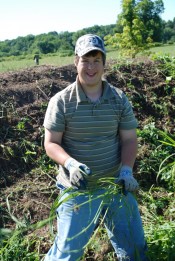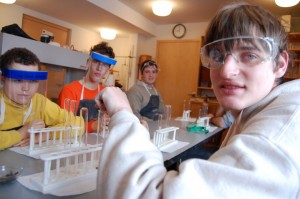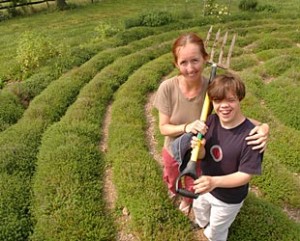Waldorf News
Missing Matthew

By LAURA SHUMAKER
My son Andy skipped ahead of me with his fresh haircut and new Quiksilver T-shirt. He tumbled into a cluster of exuberant but nervous freshmen outside the high-school gym as upperclassmen clapped and chanted, music blaring.
It was orientation day our local high school.
When it was time to get to the business of filling out forms and taking pictures for student body cards, I felt a tug on my sleeve. It was the mother of one of Andy’s friends, a woman who always knew more about everything than the average person.
“I hear you sent Matthew away to school,” she said coldly.
“Yeah, it’s hard, but I think it will be good for him in the long run.”
“Well, I think it’s sad,” she said, then turned and walked away.
I raced around and paid for books and registration fees with Andy running behind me, knowing I was distressed. I kept my chin to my chest, eyes down. Only a few of my good friends could tell that something was wrong as tears stained my beet-red face and light blue T-shirt.
“I’m fine,” I lied to Andy with my best fake smile. “Go ahead and talk to your friends. I’ll meet you in the car.”
 I ran to the car, the goofy plastic smile still planted on my face, fell in, and sobbed for what felt like hours. It was the first time I had cried since leaving my oldest son Matthew, who has autism, at Camphill Special School near Philadelphia, three thousand miles away from our Northern California home, two days before. Andy was right behind me and sat next to me as I wept, patting my back lightly and giving me sips from his water bottle.
I ran to the car, the goofy plastic smile still planted on my face, fell in, and sobbed for what felt like hours. It was the first time I had cried since leaving my oldest son Matthew, who has autism, at Camphill Special School near Philadelphia, three thousand miles away from our Northern California home, two days before. Andy was right behind me and sat next to me as I wept, patting my back lightly and giving me sips from his water bottle.
“You did the right thing, Mom,” he said. “That lady wouldn’t have said that if she knew what you’ve been through.”
We had been through a lot as a family, though the last year had been particularly difficult. Matthew is what many would consider high-functioning, but his quirky and impulsive behavior that had been manageable in earlier years had amplified dangerously with the onslaught of adolescence.
There were rages, slamming doors and police visits prompted by Matthew’s knack for approaching strangers, mostly prepubescent girls and their mothers, with inappropriate questions.
How old are you? Do you think I’m nice? Can I touch your hair?
A series of disturbing close calls was topped off with a surprise letter from an attorney. Apparently, Matthew had collided with his client, a young boy, while riding his bike.
“Matthew? Were you in a bicycle accident? Was anyone hurt?”
“Probably a boy. Who told you?”
My husband and I came to the heartbreaking conclusion that Matthew was no longer safe in the community where he had grown up, and that his impulsive actions were putting others in peril. He needed more supervision, more than our family or our school district could provide.
*****
I wasn’t prepared for the way I felt when Peter and I returned after taking Matthew to Pennsylvania. I had assumed I could enjoy the luxury of time alone at home with Matthew well taken care of and my two younger sons at school. I imagined that I’d reconnect with friends over lunch and at the gym. The strain that had aged my face would fall away, and I would look and feel rested and serene.
Instead, I felt scattered and aimless. The toll of the anxious summer had drained my energy and confidence, and my identity felt battered.  I had been the Matthew expert for 15 years. I had known exactly how to hold him when he fusses as a baby, and I knew the story behind each scar and broken bone. I was the only one who knew how to calm him during an adolescent, autistic meltdown. Now, I felt stripped of my duties.
I had been the Matthew expert for 15 years. I had known exactly how to hold him when he fusses as a baby, and I knew the story behind each scar and broken bone. I was the only one who knew how to calm him during an adolescent, autistic meltdown. Now, I felt stripped of my duties.
It seemed unnatural, even selfish, to fill the time Matthew’s absence granted me with luxurious activities such as seeing friends for lunch, relaxing in the garden, or even doing a load of laundry without interruption. Just as I was beginning to feel a little better, a friend called.
“Has Matthew left yet? Good! You must be so relieved! He doesn’t come home till Thanksgiving? Thank God!” she said.
Her insensitivity made me crazy angry, and after hanging up on her, I went into a housecleaning frenzy until Andy reminded me it was time to leave for freshmen orientation.
*****
After Andy and I returned from the scene of my public breakdown, the phone was ringing again. I hoped it wasn’t my clueless friend calling back.
“Hello, Laura? This is Andrea at Camphill.” Andrea was Matthew’s housemother. I panicked.
“Is everything OK? Did something happen?” I asked.
“Oh no,” she laughed. “Things are going well here. I am really enjoying Matthew, but I have some questions about him, and I hope you can help me.”
My heart jumped. Yes! I can help! What do you need to know?
“What are his favorite foods,” she asked. “Does he like music? How do you reward him for good behavior? He has been teasing his roommate relentlessly.”
That’s a good sign. At least I know he’s feeling like himself.
“Any ideas? The rash that was on his hands seems to have cleared up since you left, and he is sleeping well. We are enjoying him so much! Andrea told me that Matthew liked to watch her son, Joe, who was eighteen, work in the greenhouse and that they got along well.”
 I felt overwhelmed with joy and relief. Matthew was still far away, but he was safe, he was happy and he was appreciated.
I felt overwhelmed with joy and relief. Matthew was still far away, but he was safe, he was happy and he was appreciated.
We talked for almost a half hour, mother to mother, and I told her to call me any time. It occurred to me that I had felt I was a failure as a mother because I couldn’t fix Matthew. But now Andrea was acknowledging that Matthew was a puzzle, and that we needed each other to figure him out and help him grow.
“May I say hello to Matthew?”
“He’s right here.”
“Hi, Matthew!”
“Hi, Mom. I’m very busy right now. Joe and I are doing something very important.”
“I know. I just wanted to hear your voice,” I said, choking up. “I miss you, Matthew, and I love you so much.”
I could tell he was smiling.
“That’s nice.”
Laura Shumaker is the author of “A Regular Guy: Growing Up with Autism.” This article originally appeared in the Huffington Post. To view the article at source, click here.
Camphill Special School is a nonprofit Pennsylvania Approved Private School and Waldorf school accredited by AWSNA and the Middle States Association of Colleges and Schools Commissions on Elementary and Secondary Schools that offers day and residential programs for children and youth with intellectual and developmental disabilities that may include, but are not restricted to, mental retardation (MR), Autism Spectrum Disorder (ASD), Pervasive Developmental Disorders (PDD), Down Syndrome, Fetal Alcohol Syndrome (FAS), Fragile X Syndrome, Williams Syndrome, and other conditions associated with intellectual disability. Camphill Special School is part of the worldwide Camphill Movement and the only Camphill community in North America for children, as well as the only Waldorf school in the country for children with developmental and intellectual disabilities. Learn more here.
 Caring for All Stages of Life
Caring for All Stages of Life ~ Ensoul Your World With Color ~
~ Ensoul Your World With Color ~ Apply Today: New Cohort Starts Nov. 2025
Apply Today: New Cohort Starts Nov. 2025 Quality Education in the Heartland
Quality Education in the Heartland Roadmap to Literacy Books & Courses
Roadmap to Literacy Books & Courses Space speaks. Its language is movement.
Space speaks. Its language is movement. Waldorf-inspired Homeschool Curriculum
Waldorf-inspired Homeschool Curriculum Bay Area Teacher Training
Bay Area Teacher Training Transforming Voices Worldwide
Transforming Voices Worldwide Middle School Science With Roberto Trostli
Middle School Science With Roberto Trostli Full-Time Teacher Education
Full-Time Teacher Education Jamie York Books, Resources, Workshops
Jamie York Books, Resources, Workshops Waldorf Training in Australia
Waldorf Training in Australia Everything a Teacher Needs
Everything a Teacher Needs Association for a Healing Education
Association for a Healing Education Bringing Love to Learning for a Lifetime
Bringing Love to Learning for a Lifetime The Journey is Everything
The Journey is Everything Train to Teach in Seattle
Train to Teach in Seattle Summer Programs - Culminating Class Trips
Summer Programs - Culminating Class Trips Immersive Academics and Arts
Immersive Academics and Arts
 Great books for Waldorf Teachers & Families
Great books for Waldorf Teachers & Families Flexible preparation for your new grade
Flexible preparation for your new grade RSS Feeds
RSS Feeds